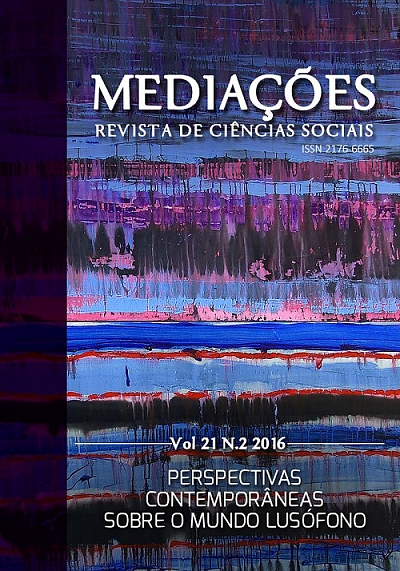Spatial segregation and school segregation: notes for a sociology of social and spacial distribution of educational institutions
DOI:
https://doi.org/10.5433/2176-6665.2016v21n2p359Keywords:
Social segregation, School segregation, Choice of establishments, Social reproductionAbstract
This article aims to provide an analytical framework for a sociology of social and spatial distribution of schools. The expansion of republican ideals, resulting from the “school democratization”, engendered a prolongation of studies, diversification of schools, terms of rows and proposed options to the children of both the elite and the working class. Henceforth, not just parents put their children in school. You need to put them in a “good school” that can assure a promising future. This requires knowledge of the education system, the social situation of the establishment, provision of time, economic and cultural capital. That is, a set of provisions and objective conditions, which are distributed in unequal ways between families. After recovering the meaning of segregation for general sociology and education, this text refers to a set of works that articulate social segregation and school segregation, outlining an analytical framework for a sociology of social and spatial distribution of schools, an innovative problem for the sociology of education in the last twenty years.Downloads
References
ALMEIDA, Ana Maria F. As escolas dos dirigentes paulistas: ensino médio, vestibular, desigualdades sociais. Belo Horizonte: Argumentum, 2009.
BEN AYED, Choukri; POUPEAU, Franck, École ségrégative, école reproductive. Actes de la Recherche en Sciences Sociales, Paris, v. 5, n. 180, p. 4-10, 2009. Disponíuvel em: https://www.cairn.info/revue-actes-de-la-recherche-en-sciences-sociales-2009- 5-page-4.htm. Acesso: 17 jan. 2015.
BEAUD, Stéphane. 80% au bac...et après: les enfants de la démocratisation scolaire. Paris: La Découverte, 2002.
BOURDIEU, Pierre; PASSERON, Jean-Claude. La réproduction: éléments pour une théorie du système d’enseignement. Paris: Minuit, 1999.
CARVALHO FILHO, Juarez Lopes. As contribuições de Pierre Bourdieu para a sociologia urbana. In: CONGRESSO BRASILEIRO DE SOCIOLOGIA, 16., 2013, Salvador. Anais... Salvador: Universidade Federal da Bahia, 2013.
CARVALHO, Marília Pinto. Desempenho escolar, gênero e raça: desafios teóricos de uma pesquisa. In: PAIXÃO, Lea Pinheiro; ZAGO, Nadir. Sociologia da educação: pesquisa e realidade brasileira. Petrópolis: Vozes, 2007. p. 182-202.
CAVALLEIRO, Eliane dos Santos. Do silêncio do lar ao silêncio escolar: racismo, preconceito e discriminação na educação infantil. São Paulo: Contexto, 2000.
CAVALLEIRO, Eliane dos Santos. Considerações sobre a etnografia na escola e práticas investigativas sobre as relações raciais e de gênero. In WELLER, Wivian; PFAFF, Nicole (Org.). Metodologias da pesquisa qualitativa em educação. Petrópolis: Vozes, 2010. p. 271-278.
CHARLE, Christophe. Situation spatiale et position sociale [essai de géographie sociale du champ littéraire à la fin du XIXème siècle]. Actes de la Recherche em Sciences Sociales, Paris, v. 13, n. 1, p. 45-59, fév. 1977.
DUBET, François. O que é uma escolar justa? a escola das oportunidades. Tradução de Ione Ribeiro Valle. São Paulo: Cortez, 2008.
DURU-BELLAT, Marie. La ségrégation sociale à l’école: faits et effets. Diversité: Ville, Ecole, Intégration, Paris, n. 139, p. 73-80, déc. 2004.
FIJALKOW, Yankel. La sociologie de la ville. Paris: La Découverte, 2002.
FRANÇOIS, Jean-Christophe; POUPEAU, Franck. Le sens du placement scolaire: la dimension spatiale des inégalités sociales. Revue Française de Pédagogie, Lyon, n. 169, p. 77-97, 2009.
FRANÇOIS, Jean-Christophe; POUPEAU, Franck. Le social et le spatial: quelques perspectives critiques sur l’analyse de la ségrégation scolaire. Espace Populations Sociétés, Villeneuve d’Ascq, v. 3, p. 367-384, 2005.
GRAFMEYER, Yves. Sociologie urbaine. Paris: Nathan, 1995.
MASCLET, Olivier. Du bastion au ghetto: Le communisme municipal em butte à l’immigration. Actes de la Recherche en Sciences Sociales, Paris, n. 159, p. 10-25, 2005.
MERLE, Pierre. La démocratisation de l’enseignement. Paris: La Découverte, 2011.
MERLE, Pierre. La ségrégation scolaire. Paris : La Découverte, 2012.
NOGUEIRA, Maria Alice. A escolha do estabelecimento de ensino pelas famílias: a ação discreta da riqueza cultural. Revista Brasileira de Educação, Rio de Janeiro, n. 7, p. 42-56, jan.-abr. 1998.
OBIN, Jean-Pierre; VAN ZANTEN, Agnès. La carte scolaire. Paris: PUF, 2010.
PAYET, Jean-Paul. La ségrégation scolaire: une perspective sociologique sur la violence à l’école. Revue Française de Pédagogie, Paris, n. 123, p. 21-34, avril-juin 1998.
PEUGNY, Camille. O destino vem do berço? desigualdade e reprodução social. Tradução de Vanina Carrara Sigrist. Campinas: Papirus, 2014.
POUPEAU, Franck; FRANÇOIS, Jean-Christophe. Le sens du placement: ségrégation résidentielle et ségrégation scolaire. Paris: Raison d’agir, 2008.
ROMANELLI, Geraldo; NOGUEIRA, Maria Alice; ZAGO, Nadir (Org.). Família e escola: novas perspectivas de análise. Petrópolis: Vozes, 2013.
ROMANELLI, Geraldo; NOGUEIRA, Maria Alice; ZAGO, Nadir (Org.). Família e escola: trajetórias de escolarização em camadas médias e populares. Petrópolis: Vozes, 2011.
WACQUANT, Loïc. Parias: ghetto, banlieues. Paris: État. La Découverte, 2006.
WHYTE, William Foote. Sociedade de esquina: a estrutura social de uma área urbana pobre e degradada. Tradução de Maria Lúcia de Oliveira. Rio de Janeiro: Jorge Zahar, 2005.
Downloads
Published
How to Cite
Issue
Section
License
Copyright on articles published in Mediações belongs to the author(s): in the case of partial or entire republication of the original publication, we ask author(s) to indicate the original publication in the periodical.
Mediações uses the Creative Commons Attribution 4.0 International license, which allows Open Access, enabling any user to read, download, copy and disseminate its content so long as adequately referenced.
The opinions expressed by the author(s) are their sole responsibility.
































